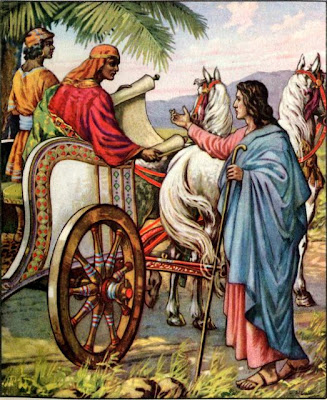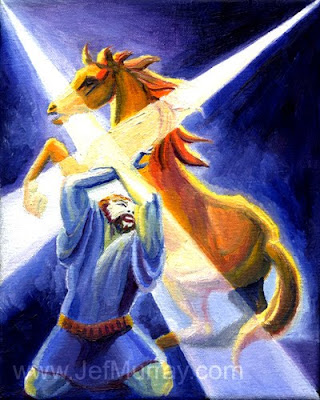PHILIP AND THE ETHIOPIAN
A rather well-known passage from Acts was the first reading for mass on Thursday: The story of Philip’s encounter with the Ethiopian eunuch in Acts 8:26-40. It is Luke the consummate story-teller at his best. There are angels, lots of physical action, and a high-ranking and exotic personage who is open to the movement of the Spirit. Philip is portrayed in the trappings of the prophet Elijah who was addressed by an angel in 2 Kgs 1:15, who ran alongside the chariot of a powerful person in 1 Kgs 18:46, and was carried from place to place by the Spirit in 1 Kgs 18:12. The text is certainly worth a close reading:
Then an angel of the Lord said to Philip, ‘Get up and go towards the south to the road that goes down from Jerusalem to Gaza.’ (This is a wilderness road.) So he got up and went. Now there was an Ethiopian eunuch, a court official of the Candace, queen of the Ethiopians, in charge of her entire treasury. He had come to Jerusalem to worship and was returning home; seated in his chariot, he was reading the prophet Isaiah. Then the Spirit said to Philip,
 ‘Go over to this chariot and join it.’ So Philip ran up to it and heard him reading the prophet Isaiah. He asked, ‘Do you understand what you are reading?’ He replied, ‘How can I, unless someone guides me?’ And he invited Philip to get in and sit beside him. Now the passage of the scripture that he was reading was this: ‘Like a sheep he was led to the slaughter, and like a lamb silent before its shearer, so he does not open his mouth. In his humiliation justice was denied him. Who can describe his generation? For his life is taken away from the earth.’ The eunuch asked Philip, ‘About whom, may I ask you, does the prophet say this, about himself or about someone else?’ Then Philip began to speak, and starting with this scripture, he proclaimed to him the good news about Jesus. As they were going along the road, they came to some water; and the eunuch said, ‘Look, here is water! What is to prevent me from being baptized?’ He commanded the chariot to stop, and both of them, Philip and the eunuch, went down into the water, and Philip baptized him. When they came up out of the water, the Spirit of the Lord snatched Philip away; the eunuch saw him no more, and went on his way rejoicing. But Philip found himself at Azotus, and as he was passing through the region, he proclaimed the good news to all the towns until he came to Caesarea. (Acts 8:26-40)
‘Go over to this chariot and join it.’ So Philip ran up to it and heard him reading the prophet Isaiah. He asked, ‘Do you understand what you are reading?’ He replied, ‘How can I, unless someone guides me?’ And he invited Philip to get in and sit beside him. Now the passage of the scripture that he was reading was this: ‘Like a sheep he was led to the slaughter, and like a lamb silent before its shearer, so he does not open his mouth. In his humiliation justice was denied him. Who can describe his generation? For his life is taken away from the earth.’ The eunuch asked Philip, ‘About whom, may I ask you, does the prophet say this, about himself or about someone else?’ Then Philip began to speak, and starting with this scripture, he proclaimed to him the good news about Jesus. As they were going along the road, they came to some water; and the eunuch said, ‘Look, here is water! What is to prevent me from being baptized?’ He commanded the chariot to stop, and both of them, Philip and the eunuch, went down into the water, and Philip baptized him. When they came up out of the water, the Spirit of the Lord snatched Philip away; the eunuch saw him no more, and went on his way rejoicing. But Philip found himself at Azotus, and as he was passing through the region, he proclaimed the good news to all the towns until he came to Caesarea. (Acts 8:26-40)
THE GOSPEL BREAKS OUT
 You may know that the Acts of the Apostles recounts the growth and spread of the early church, especially under Peter and Paul. It tells how the Christian faith burst out of the confines of Jerusalem and began to spread to Samaria and nearby areas and then, in ever-widening circles, beyond Greece and even Rome itself and beyond. So then, where does the account of the baptism of the Ethiopian court official fit into this scheme?
You may know that the Acts of the Apostles recounts the growth and spread of the early church, especially under Peter and Paul. It tells how the Christian faith burst out of the confines of Jerusalem and began to spread to Samaria and nearby areas and then, in ever-widening circles, beyond Greece and even Rome itself and beyond. So then, where does the account of the baptism of the Ethiopian court official fit into this scheme?
The eunuch is returning from worshiping in Jerusalem and is reading the prophet Isaiah. So if he is not a Jew he is certainly one of those from far-off lands that the prophets predicted would come to worship the Lord at the temple in the great in-gathering of the nations:
At that time I will change the speech of the peoples to a pure speech, that all of them may call on the name of the Lord and serve him with one accord. From beyond the rivers of Ethiopia my suppliants, my scattered ones, shall bring my offering. (Zeph 3:9-10)
Incidentally, as a eunuch he would have been barred from full participation in temple worship and even in the Jewish community. But here he is being baptized and welcomed into the Christian communion. The movement seems to be toward Jerusalem rather than away from it.
Think of how before a wave breaks on the shore the water recedes as the next wave gathers itself up to then crash with full force onto the beach. The story of the Ethiopian is like that final drawing back of the tide before the wave breaks, the last Jerusalem-centered movement before the great expansion of the gospel message begins.
The very next verse following this episode introduces us to the key
 player in the spread of the Gospel to the gentiles: “Meanwhile Saul, still breathing threats and murder against the disciples of the Lord, went to the high priest and asked him for letters to the synagogues at Damascus” (Acts 9:1-2). With the conversion if Saul the waves are about to begin to burst outward in earnest, breaking onto the non-Jewish world.
player in the spread of the Gospel to the gentiles: “Meanwhile Saul, still breathing threats and murder against the disciples of the Lord, went to the high priest and asked him for letters to the synagogues at Damascus” (Acts 9:1-2). With the conversion if Saul the waves are about to begin to burst outward in earnest, breaking onto the non-Jewish world.
Indeed, Luke will immediately devote chapters 10-12 to recounting in great detail the conversion of the pagan Cornelius, an event which he clearly considers to be the great turning point since it is the conversion of the first gentile to the faith.
CHASING THE SPIRIT
I found an interesting lesson for myself in the story of the baptism of the Ethiopian official. Remember, first of all, that, as in the rest of Acts, the Holy Spirit is behind every action: “Then an angel of the Lord said to Philip, ‘Get up and go towards the south,’” “Then the Spirit said to Philip, ‘Go and catch up with that chariot,’” and “When they came up out of the water, the Spirit of the Lord snatched Philip away.”
These dramatic interventions clearly show Luke’s fundamental conviction that “the mission is not first of all a result of human enterprise but of the Spirit’s impulse. The Christian missionaries are constantly
 trying to keep up with God’s action” (Luke T. Johnson, The Acts of the Apostles, 160) . We have in the story of the Ethiopian official a literal example of "trying to keep up with God's action: "The Spirit told Philip, "Go and join that chariot," and poor Philip had to run to catch up with it! The text makes it clear that he was actually jogging alongside the chariot for awhile listening to the Ethiopian reading the scripture aloud.
trying to keep up with God’s action” (Luke T. Johnson, The Acts of the Apostles, 160) . We have in the story of the Ethiopian official a literal example of "trying to keep up with God's action: "The Spirit told Philip, "Go and join that chariot," and poor Philip had to run to catch up with it! The text makes it clear that he was actually jogging alongside the chariot for awhile listening to the Ethiopian reading the scripture aloud.
I don’t know about you, but there are periods when I get a little winded “trying to keep up with God’s action”. When my careful plans go haywire or events get beyond my control, I have to run to catch up with the work of the Spirit. When things are clearly no longer going according to my own plan I have to hustle to join in the plan that God has in mind.
The root of the word "spirit" in both Greek and Latin is the word for "breath, wind." It sounds a little paradoxical but chasing the Spirit can leave you winded sometimes. When you start to get short of breath trying to keep up with the Spirit's action in your life you may want to say a quick prayer to Saint Philip, who must be, after all, the patron saint of joggers.
.


No comments:
Post a Comment